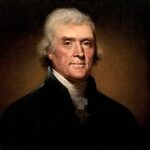The Jefferson Sally Hemings Relationship Begins
Thomas Jefferson began an intimate relationship with Sally Hemings around 1787. Hemings was an enslaved woman at Jefferson’s Monticello plantation. She was also the half-sister of Jefferson’s late wife, Martha. This relationship lasted nearly four decades until Jefferson’s death. ⚠️ The power dynamic made genuine consent impossible under slavery’s brutal system.
The Contradictory Nature of Jefferson’s Actions
Jefferson penned the words “all men are created equal” in the Declaration of Independence. Yet he simultaneously owned over 600 enslaved people throughout his lifetime. The Jefferson Sally Hemings relationship epitomized this fundamental hypocrisy. He championed liberty while denying freedom to those he enslaved.
Children Born into Bondage
Historical evidence suggests Jefferson fathered at least six children with Hemings. 📊 DNA testing in 1998 confirmed the paternal connection to at least one child. These children were born into slavery despite their presidential parentage. Jefferson freed only two of Hemings’ children during his lifetime. 💰 The others remained his property, highlighting slavery’s dehumanizing economic calculations.
Impact:
Damage to Jefferson’s Historical Legacy
The Jefferson Sally Hemings relationship fundamentally altered how Americans view their third president. Revelations about this relationship exposed the founding father’s moral contradictions. His reputation as a champion of human rights suffered permanent damage. 🔥 Modern historians now emphasize Jefferson’s participation in slavery’s violence and exploitation.
Impact on American Understanding of Slavery
This relationship illuminated slavery’s inherent brutality and sexual exploitation. It demonstrated how enslaved women faced systematic abuse from their owners. The power imbalance made resistance nearly impossible for Hemings. 📉 Public understanding of slavery’s true nature deepened through this historical examination.
Broader Historical Reckoning
The Jefferson Sally Hemings story sparked wider examination of founding fathers’ hypocrisies. Americans began questioning the sanitized version of early national history. This reckoning extended beyond Jefferson to other slaveholding presidents. 🌍 International observers noted America’s struggle to confront its founders’ moral failures. The relationship became a symbol of how power corrupts and how historical narratives often obscure uncomfortable truths.
